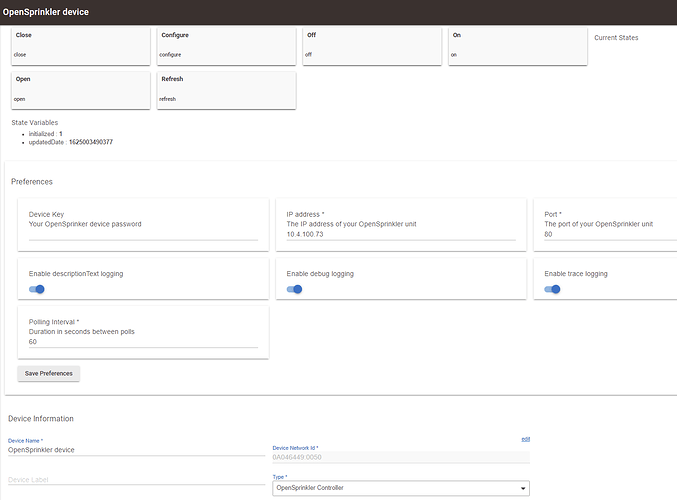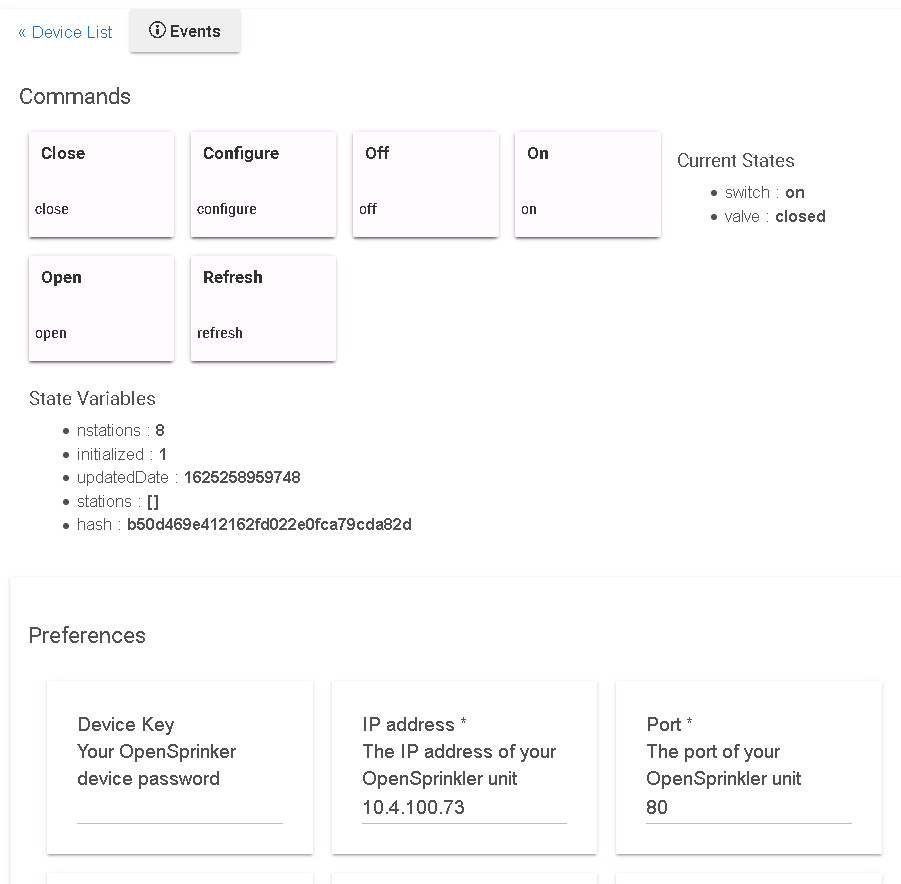/**
*/
import groovy.json.JsonSlurper
import java.security.MessageDigest
def getSTATUS() {
return "status"
}
def getENABLED() {
return "enabled"
}
def getSTATION_RUN() {
return "station-run"
}
def getSTATION_OFF() {
return "station-off"
}
def getRUN_ONCE_RUN() {
return "run-once-run"
}
def getRUN_ONCE_OFF() {
return "run-once-off"
}
def getALL() {
return "all"
}
metadata {
definition(name: "OpenSprinkler Controller", namespace: "codahq-hubitat", author: "Ben Rimmasch") {
capability "Refresh"
capability "Sensor"
capability "Configuration"
capability "Switch"
capability "Valve"
//attribute "operationEnabled", "bool"
}
preferences {
input("password", "text", title: "Device Key", description: "Your OpenSprinker device password")
input("ipadd", "text", title: "IP address", description: "The IP address of your OpenSprinkler unit", required: true)
input("port", "text", title: "Port", description: "The port of your OpenSprinkler unit", required: true)
input name: "descriptionTextEnable", type: "bool", title: "Enable descriptionText logging", defaultValue: true
input name: "logEnable", type: "bool", title: "Enable debug logging", defaultValue: true
input name: "traceLogEnable", type: "bool", title: "Enable trace logging", defaultValue: true
input name: "pollingInterval", type: "number", range: 5..3600, title: "Polling Interval", description: "Duration in seconds between polls", defaultValue: 60, required: true
}
}
def installed() {
initialize()
}
def uninstalled() {
getChildDevices().each {
log.warn "Deleting device ${it.label} with DNI ${it.deviceNetworkId}"
deleteChildDevice(it.deviceNetworkId)
}
}
def updated() {
if (!state.initialized) {
initialize()
}
try {
if (ipadd != null && port != null) {
if (device.deviceNetworkId != getHexHostAddress()) {
device.deviceNetworkId = getHexHostAddress()
logInfo "Device Network ID set to: ${device.deviceNetworkId}"
}
}
else {
log.warn "IP and port must be configured in the device's preferences in the IDE."
}
}
catch (Exception e) {
log.warn "Couldn't set Device Network ID: ${e}"
}
if (password != null) {
state.hash = generateMD5(password)
device.updateSetting("password", [type: "STRING", value: ""])
}
if (state.hash == null) {
log.warn "A password must be configured in the device's preferences in the IDE."
}
configure()
refresh()
}
def initialize() {
logDebug "Initialize triggered"
state.initialized = 1
logInfo "Receiving local POST on ${device.hub?.getDataValue('localIP')}:${device.hub?.getDataValue('localSrvPortTCP')}"
}
def configure() {
api(ALL)
}
def refresh() {
logInfo "Refreshing status from ${device.label}"
unschedule()
state.updatedDate = now()
api(STATUS)
api(ENABLED)
customPolling()
}
def open() {
unschedule()
def durations = "["
state.stations.eachWithIndex {
station, idx ->
int dur
if (!station.disabled) {
def child = getChildDevice(getChildDeviceId(idx))
dur = child.duration() == null ? 0 : child.duration()
}
else {
dur = 0
}
durations += "${dur},"
}
durations = durations.substring(0, durations.length() - 1) + "]"
logTrace durations
api(RUN_ONCE_RUN, [durations: durations])
}
def close() {
unschedule()
api(RUN_ONCE_OFF)
}
def customPolling() {
logTrace "customPolling(${pollingInterval}) now:${now()} state.updatedDate:${state.updatedDate}"
if (!isConfigured()) {
logInfo "Polling canceled. Please configure the device!"
return
}
double timesSinceContact = (now() - state.updatedDate).abs() / 1000 //time since last update in seconds
logDebug "Polling started. timesSinceContact: ${timesSinceContact} seconds"
if (timesSinceContact > pollingInterval) {
logDebug "Polling interval exceeded"
refresh()
}
runIn(pollingInterval, customPolling) //time in seconds
}
def api(method, args = []) {
logDebug "api(${method}, ${args})"
def methods = [
"status": [gdipadd: "${ipadd}", gdport: "${port}", gdpath: "/js?pw=${state.hash}", gdtype: "GET"],
"station-run": [gdipadd: "${ipadd}", gdport: "${port}", gdpath: "/cm?pw=${state.hash}&sid=${args.sid}&en=1&t=${ args.duration != null ? args.duration : 30 }", gdtype: "GET"],
"station-off": [gdipadd: "${ipadd}", gdport: "${port}", gdpath: "/cm?pw=${state.hash}&sid=${args.sid}&en=0", gdtype: "GET"],
"run-once-run": [gdipadd: "${ipadd}", gdport: "${port}", gdpath: "/cr?pw=${state.hash}&t=${ args.durations != null ? args.durations : "[0, 0, 0, 0, 0, 0, 0, 0]" }", gdtype: "GET"],
"run-once-off": [gdipadd: "${ipadd}", gdport: "${port}", gdpath: "/cv?pw=${state.hash}&rsn=1", gdtype: "GET"],
"all": [gdipadd: "${ipadd}", gdport: "${port}", gdpath: "/ja?pw=${state.hash}", gdtype: "GET"],
"enabled": [gdipadd: "${ipadd}", gdport: "${port}", gdpath: "/jc?pw=${state.hash}", gdtype: "GET"]
]
if (method == STATION_RUN && device.currentValue("valve") != "open") {
logInfo "A station valve is open!"
sendEvent([name: "valve", value: "open", isStateChange: true])
}
def request = methods.getAt(method)
doRequest(request.gdipadd, request.gdport, request.gdpath, request.gdtype)
//http://10.10.10.250/jp?cr=ec5e317122e24ef7354e94697ef321c0&t=[5,0,5,0,5,0,5,0]
}
private doRequest(gdipadd, gdport, gdpath, gdtype) {
logDebug "doRequest($gdipadd, $gdport, $gdpath, $gdtype)"
if (!isConfigured()) {
logInfo "Request canceled. Please configure the device!"
return
}
def hexHostPort = getHexHostAddress()
logTrace "Hex Host:Port is : ${hexHostPort}"
logTrace "DNI is ${device.deviceNetworkId}"
logTrace "And just for good measture: ${getHostAddress()}"
logTrace "Path is: ${gdpath}"
def headers = [: ]
headers.put("HOST", "${gdipadd}:${gdport}")
try {
logTrace "About to create HubAction"
def hubAction = new hubitat.device.HubAction(
[
method: gdtype,
path: gdpath,
headers: headers
]
, "${hexHostPort}"
)
logTrace "After HubAction: ${hubAction}"
return sendHubCommand(hubAction)
}
catch (Exception e)
{
logDebug "Hit exception in doRequest: ${hubAction}"
logDebug e
}
}
def parse(description) {
logDebug "start parse"
try {
def msg = parseLanMessage(description)
logTrace "msg: ${msg}"
def slurper = new groovy.json.JsonSlurper()
def json = slurper.parseText(msg.body)
logTrace json
if (json.settings) {
handleSetup(json)
}
if (json.sn) {
handleStationStatus(json)
}
if (json.en) {
handleEnabled(json.en)
}
if (json.result || json.refresh) {
if (json.result != 1) {
log.warn "Last action was not successful! Result: ${json.result}"
}
logInfo "Update needed. Doing refresh!"
runIn(3, refresh, [overwrite: false])
}
}
catch (Exception e)
{
logDebug "Hit exception in parse"
logDebug e
}
}
private handleSetup(json) {
logDebug "handleSetup() ${json}"
def stations = handleStationNames(json.stations)
stations.eachWithIndex {
station, idx ->
if (idx < state.nstations && !station.disabled) {
logDebug "Checking enabled station ${station} at index ${idx}"
def deviceId = getChildDeviceId(idx)
if (!getChildDevice(deviceId)) {
addChildDevice("codahq-hubitat", "OpenSprinkler Station", deviceId, [name: "OpenSprinkler Station", label: "OS Station ${station.name}", isComponent: false])
logInfo "Added station ${station.name} with device id ${deviceId}"
}
}
else {
def child = getChildDevice(getChildDeviceId(idx))
if (child) {
log.warn "Station ${child.label} is no longer enabled and will not be used."
}
}
}
handleEnabled(json.settings.en)
}
private handleStationStatus(json) {
logDebug "handleStationStatus() ${json}"
if (json.nstations && json.nstations != state.nstations) {
state.nstations = json.nstations
logInfo "Number of stations set to ${state.nstations}"
}
if (!json.sn) return
def stations = []
def valveOpen = false
state.stations.eachWithIndex {
station, idx ->
logTrace "${station} index:${idx} open:${json.sn[idx]}"
//if (json.sn[idx] == 1) {
// logInfo "Station ${station.name} (${idx}) is open"
//}
def child = getChildDevice(getChildDeviceId(idx))
if (child != null) {
logTrace "child.state.switch: ${child.currentValue("switch")}"
def switchState = station.disabled == 1 ? "off" : "on"
if (child.currentValue("switch") != switchState) {
child.sendEvent([name: "switch", value: switchState, isStateChange: true])
logInfo "Station ${station.name} is ${switchState}"
}
logTrace "child.state.valve: ${child.currentValue("valve")}"
def valveState = json.sn[idx] == 1 ? "open" : "closed"
if (child.currentValue("valve") != valveState) {
child.sendEvent([name: "valve", value: valveState, isStateChange: true])
logInfo "Station ${station.name} is ${valveState}"
}
}
stations << [name: station.name, open: json.sn[idx], disabled: station.disabled]
valveOpen = valveOpen || json.sn[idx] == 1
}
def valveState = valveOpen ? "open" : "closed"
if (device.currentValue("valve") != valveState) {
logInfo "OpenSprinker is ${valveState}"
sendEvent([name: "valve", value: valveState, isStateChange: true])
}
state.stations = stations
return stations
}
private handleStationNames(json) {
logDebug "handleStationNames() ${json}"
if (!state.nstations) return
if (!json.stn_dis) return
def bits = convertIntToBitSet(json.stn_dis[0])
logDebug bits
boolean[] disabled = new boolean[state.nstations]
int index = 0;
for (int i = bits.length() - 1; i >= 0; i--)
{
disabled[i] = bits.charAt(index) == "1"
index++
}
def stations = []
json.snames.eachWithIndex {
name, idx ->
if (idx < state.nstations) {
logDebug "Found station ${name} at index ${idx}"
stations << [name: name, disabled: disabled[idx]]
}
}
state.stations = stations
}
private handleEnabled(enabled) {
logDebug "handleEnabled($enabled)"
def value = enabled ? "on" : "off"
if (device.currentValue("switch") != value) {
logInfo "OpenSprinkler Controller is ${value}"
sendEvent([name: "switch", value: value, displayed: true, isStateChange: true])
}
}
/General Helper Methods/
private isConfigured() {
return ipadd && port && state.hash
}
/To Hex Helper Methods/
private String convertIPToHex(ipAddress) {
String hex = ipAddress.tokenize('.').collect { String.format('%02x', it.toInteger()) }.join()
logTrace "IP address entered is ${ipAddress} and the converted hex code is ${hex}"
return hex.toUpperCase()
}
private String convertPortToHex(port) {
String hexport = port.toString().format('%04x', port.toInteger())
logTrace "Port entered is ${port} and the converted hex port is ${hexport}"
return hexport.toUpperCase()
}
/Out of Hex Help Methods/
//private Integer convertHexToInt(hex) {
// if (isDebug()) log.debug "Convert hex to int: ${hex}"
// return Integer.parseInt(hex,16)
//}
//private String convertHexToIP(hex) {
// if (isDebug()) log.debug("Convert hex to ip: $hex") // a0 00 01 6
// [convertHexToInt(hex[0..1]),convertHexToInt(hex[2..3]),convertHexToInt(hex[4..5]),convertHexToInt(hex[6..7])].join(".")
//}
//private getHostAddress() {
// def parts = device.deviceNetworkId.split(":")
// if (isDebug()) log.debug "Device Network ID: $device.deviceNetworkId"
// def ip = convertHexToIP(parts[0])
// def port = convertHexToInt(parts[1])
// return ip + ":" + port
//}
private getHostAddress() {
return "${ipadd}:${port}"
}
private getHexHostAddress() {
def hosthex = convertIPToHex(ipadd)
def porthex = convertPortToHex(port)
if (porthex.length() < 4) {
porthex = "00" + porthex
}
logTrace "Hosthex is : $hosthex"
logTrace "Port in Hex is $porthex"
return "${hosthex}:${porthex}"
}
def generateMD5(String s){
MessageDigest.getInstance("MD5").digest(s.bytes).encodeHex().toString()
}
private convertIntToBitSet(int bits) {
logTrace bits
Integer.toBinaryString(bits)
}
private getChildDeviceId(index) {
return "${device.deviceNetworkId}-${index}".toString()
}
private logInfo(msg) {
if (descriptionTextEnable) log.info msg
}
def logDebug(msg) {
if (logEnable) log.debug msg
}
def logTrace(msg) {
if (traceLogEnable) log.trace msg
}




